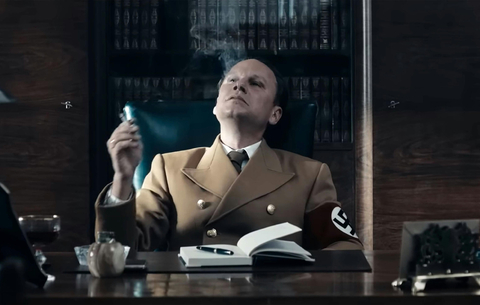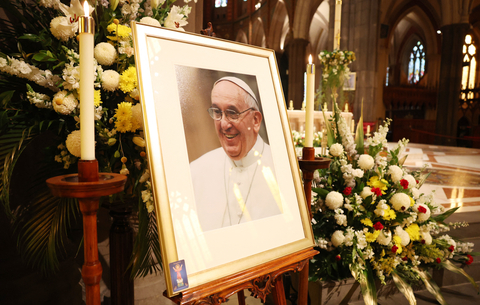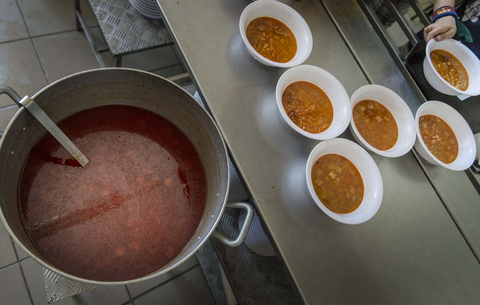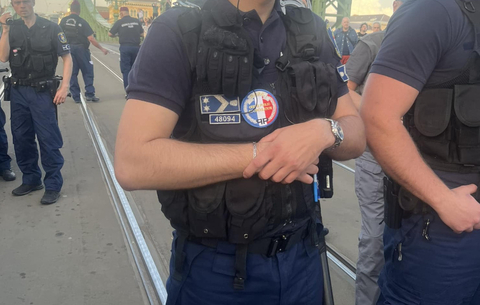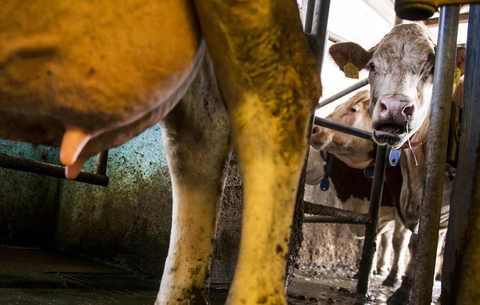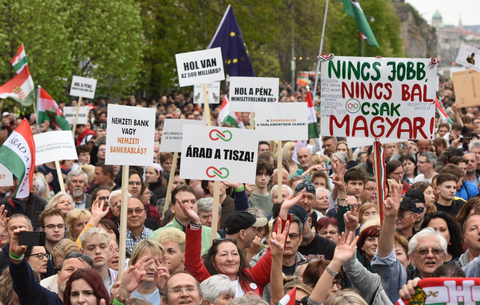The Budapest mayoral race
Back in spring, it was assumed that the reigning mayor would easily win re-election, defeating his rival by a wide margin. Gallup's latest poll shows that Gabor Demszky's lead has melted away, and if things don't change, he may find himself being kicked out of his mayoral throne.
There is often a moment in a match when the team that seemed sure to win suddenly realises it may have a real contest on its hands.
In Gabor Demszky's case, the moment this happened can be precisely identified. Gallup's poll shows that Tarlos has a 1 percentage point lead over his rival in terms of the public's perception of his suitability for the job. Only a fifth of voters reject the Fidesz-backed candidate, whereas a third of voters reject the coalition's candidate. 35 per cent of voters would choose Demszky, 37 per cent would choose Tarlos. The largest opposition party's candidate achieved this despite the anti-Demszky protest vote being divided between three other anti-Demszky candidates.
It was during the heatwave that the scandal over the newly-acquired Combino trams put a roadblock in the way of Demszky's triumphal romp home: his popularity fell. Even then it seemed that, though the race would be tight, Budapest would have the same mayor after the elections. But now, partly because of the feebleness of the campaign start, and partly because of the question marks thrown up by City Hall's role in the 18 August firework cataclysm, Demszky's lead has been shrivelling.
Even within his own party and his liberal voters bass, Demszky's aura has become tarnished. The relationship between the mayor and his Free Democrat party has always been curious. The party knows his faults, but they cannot get rid of him without losing all their elected officials in the city. Increasing numbers of liberals are realising that though Demszky's political beliefs may be more appealing than Tarlos's, Budapest could be far better run than the way Demszky does it, especially as he loses his touch.
Istvan Tarlos's smile is forced, and his gestures are awkward. His raw, suburban manners hide authoritarian leanings. He is no fan of the festival-based youth subculture of the city on either side of the Danube. He is likely to be in favour of public order and imposing tight restrictions. Gays, the homeless and young party animals are unlikely to be fans of Tarlos.
Viktor Orban, who supports his candidacy, had an even more disastrous approach to the capital, with his freezing of the fourth metro line and his proposal to establish a Budapest Ministry reminiscent of the one-party state.
Even so, it seems likely that Tarlos would be rather better at managing the city than the current leadership. That's hardly an accolade: Demszky has hardly been a star, but his challengers have been pathetic. But let's make it clear: Budapest is becoming famous for mad parking regulations, axle-breaking potholes, endless traffic jams, incompetent city administration and a physical appearance that might qualify as visual pollution. Even today they have not managed to implement the park and ride system that other cities have tried so successfully.
The 1994-1998 coalition, which included Demszky's own party, was the only government since the regime change to have the two thirds majority needed to change the constitution. They could have reformed the structure of local government, cutting the number of boroughs within Budapest by a third or a half and promoting efficiency by taking an axe to bureaucracy. But no, they contented themselves with changing the law on local elections to suit their own needs.
On not one occasion has Demszky won election because of his own charisma or his success in the job. He benefited from the liberalism of the capital, which is much greater than the Hungarian average, and he was lucky. In 1990 he benefited from the declining reputation of the MDF government and his fame as a samizdat writer in the previous regime. Four years later, it was the greyness of his challengers from the right and the left that guaranteed his victory.
The Orban government that took office in 1998 was made even more serious by the presence of Jozsef Torgyan, leader of the Smallholders, in its cabinet. This government prioritised regional development from the first. Once again, they chose a candidate who was more or less a human sacrifice. The years that followed just helped Demszky even more, as he became Budapest's protector against a right-wing that seethed with contempt for the "sinful city".
Things have gone less smoothly since. In its first 100 days, the Medgyessy government ordered huge pay rises for public sector workers. This burden fell primarily on the local authorities, who had to make cuts elsewhere in response. This left the city administration in trouble and left little to spare to finance the rusting public transport infrastructure.
Meanwhile, Demszky became ever more grandiose, as can be seen from the scandals surrounding his supposedly semi-legal Croatian summer villa and the off-road vehicle he borrowed from the city to get there. However modern, trendy and liberal the mayor, beneath him, City Hall seemed increasingly bureaucratic and ineffective.
There is no guarantee that Demszky will fall. Maybe the scent of defeat will act like an adrenalin boost for the mayor and his team, forcing them to make good some of their past mistakes. Tarlos's hopes could be undermined if he keeps up his public gaffs. In any case, the match has suddenly become a lot more exciting, the end result far less certain, than we though a few weeks ago.
Tamas Laszlo Papp
In Gabor Demszky's case, the moment this happened can be precisely identified. Gallup's poll shows that Tarlos has a 1 percentage point lead over his rival in terms of the public's perception of his suitability for the job. Only a fifth of voters reject the Fidesz-backed candidate, whereas a third of voters reject the coalition's candidate. 35 per cent of voters would choose Demszky, 37 per cent would choose Tarlos. The largest opposition party's candidate achieved this despite the anti-Demszky protest vote being divided between three other anti-Demszky candidates.
It was during the heatwave that the scandal over the newly-acquired Combino trams put a roadblock in the way of Demszky's triumphal romp home: his popularity fell. Even then it seemed that, though the race would be tight, Budapest would have the same mayor after the elections. But now, partly because of the feebleness of the campaign start, and partly because of the question marks thrown up by City Hall's role in the 18 August firework cataclysm, Demszky's lead has been shrivelling.
Even within his own party and his liberal voters bass, Demszky's aura has become tarnished. The relationship between the mayor and his Free Democrat party has always been curious. The party knows his faults, but they cannot get rid of him without losing all their elected officials in the city. Increasing numbers of liberals are realising that though Demszky's political beliefs may be more appealing than Tarlos's, Budapest could be far better run than the way Demszky does it, especially as he loses his touch.
Istvan Tarlos's smile is forced, and his gestures are awkward. His raw, suburban manners hide authoritarian leanings. He is no fan of the festival-based youth subculture of the city on either side of the Danube. He is likely to be in favour of public order and imposing tight restrictions. Gays, the homeless and young party animals are unlikely to be fans of Tarlos.
Viktor Orban, who supports his candidacy, had an even more disastrous approach to the capital, with his freezing of the fourth metro line and his proposal to establish a Budapest Ministry reminiscent of the one-party state.
Even so, it seems likely that Tarlos would be rather better at managing the city than the current leadership. That's hardly an accolade: Demszky has hardly been a star, but his challengers have been pathetic. But let's make it clear: Budapest is becoming famous for mad parking regulations, axle-breaking potholes, endless traffic jams, incompetent city administration and a physical appearance that might qualify as visual pollution. Even today they have not managed to implement the park and ride system that other cities have tried so successfully.
The 1994-1998 coalition, which included Demszky's own party, was the only government since the regime change to have the two thirds majority needed to change the constitution. They could have reformed the structure of local government, cutting the number of boroughs within Budapest by a third or a half and promoting efficiency by taking an axe to bureaucracy. But no, they contented themselves with changing the law on local elections to suit their own needs.
On not one occasion has Demszky won election because of his own charisma or his success in the job. He benefited from the liberalism of the capital, which is much greater than the Hungarian average, and he was lucky. In 1990 he benefited from the declining reputation of the MDF government and his fame as a samizdat writer in the previous regime. Four years later, it was the greyness of his challengers from the right and the left that guaranteed his victory.
The Orban government that took office in 1998 was made even more serious by the presence of Jozsef Torgyan, leader of the Smallholders, in its cabinet. This government prioritised regional development from the first. Once again, they chose a candidate who was more or less a human sacrifice. The years that followed just helped Demszky even more, as he became Budapest's protector against a right-wing that seethed with contempt for the "sinful city".
Things have gone less smoothly since. In its first 100 days, the Medgyessy government ordered huge pay rises for public sector workers. This burden fell primarily on the local authorities, who had to make cuts elsewhere in response. This left the city administration in trouble and left little to spare to finance the rusting public transport infrastructure.
Meanwhile, Demszky became ever more grandiose, as can be seen from the scandals surrounding his supposedly semi-legal Croatian summer villa and the off-road vehicle he borrowed from the city to get there. However modern, trendy and liberal the mayor, beneath him, City Hall seemed increasingly bureaucratic and ineffective.
There is no guarantee that Demszky will fall. Maybe the scent of defeat will act like an adrenalin boost for the mayor and his team, forcing them to make good some of their past mistakes. Tarlos's hopes could be undermined if he keeps up his public gaffs. In any case, the match has suddenly become a lot more exciting, the end result far less certain, than we though a few weeks ago.
Tamas Laszlo Papp
English version
HVG
2006. szeptember. 07. 15:00
Hungarian-Slovak Tensions
English version
hvg.hu
2006. szeptember. 11. 12:30
Exam time
English version
HVG
2006. szeptember. 07. 15:10
András Cser-Palkovics
English version
Associated Press
2006. szeptember. 18. 01:31
Hungary PM admits to deluge of lies
English version
hvg.hu
2006. szeptember. 11. 12:27
Politicians and their gaffs
English version
HVG
2006. szeptember. 14. 10:44
Principled hecklers
English version
2006. szeptember. 18. 01:45
